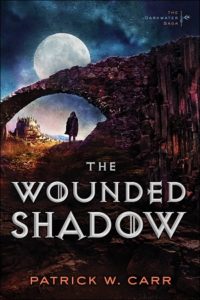What inspired you to start out the series with a kind of “crime fiction story wrapped inside a fantasy,” before ramping it up to such an epic scale for the finale?
 I’ve always loved the idea of taking two dissimilar genres and putting them in the Ninja blender. After I wrapped up “The Staff and the Sword” my editor and agent asked me what I wanted to pursue next. I’d had the idea for a medieval/suspense/epic for a while and decided to pursue that.
I’ve always loved the idea of taking two dissimilar genres and putting them in the Ninja blender. After I wrapped up “The Staff and the Sword” my editor and agent asked me what I wanted to pursue next. I’d had the idea for a medieval/suspense/epic for a while and decided to pursue that.
The progression from mystery to epic seemed natural enough: Introduce of series of murders that increase in importance and consequence until the entire world is at stake. Then take that progression and place it in a fantasy world with its own rules.
Of course, I’ve described something in a few sentences that took years to create and uncounted man-hours to get right. I did a rough calculation once of how many words were cut and tossed to get the manuscripts as close to perfect as I could make them and it was in excess of 100,000. That’s not a typo. I threw away an entire novel striving to make this world as tight and coherent as human effort could contrive. Thankfully, the readers who’ve reviewed The Wounded Shadow so far have been very appreciative. It was a mammoth undertaking.
What was the most difficult part of wrapping up The Darkwater Saga?
Getting all the plotlines to resolve in a meaningful way that stayed true to the characters, true to the story, and true to the reader. I had an entire plotline, Toria Deel’s, that I ended up throwing away after the first draft was completed.
I had the feeling once the first draft was done, that one of my three story lines was weaker than the other two. Fortunately, I have these amazing beta-readers. They’re all good friends from the school where I used to teach. We met for lunch after they read the first draft and I asked them point blank “Which of the storylines was the weakest?” I hadn’t telegraphed what I thought, I just asked. Three out of four told me what I’d already suspected.
So, I went back and completely rewrote Toria Deel’s plot line. But that meant that it had to be re-integrated into the rest of the story. What a headache! But it was either that, or put out a book that was less than the best that I could produce. Yeah, I’m never going to do that if I can help it.
Which of the Darkwater characters do you consider to be the series MVP?
Actually, that depends on the book. In the introductory novella and the first book, it would have to be Willet Dura. In the second book, it’s probably Fess. Then in the third book, I would choose Mark. Bolt gets a solid runner up in each of the books, but I probably need to explain my choices, especially since Fess and Mark are secondary characters and neither of them carry the point of view.
What makes them MVP’s in my opinion is that they carry the moral load of the narrative in the last two books. In book two, Fess struggles terribly as he works to reconcile how the world and people are with how he wants them to be. In book three, Mark fulfills a similar role.
Both of them serve to put the Vigil on the spot, as it were, forcing Bronwyn, Toria, and Pellin to justify their actions. It was marvelously fun and challenging to write and by the time I was done, I was completely in love with my characters.
What are the challenges of creating a fantastical world while keeping it grounded in a biblical worldview?
 Actually, it’s not as much of a challenge as you would think. I write incredibly flawed characters. Errol is a drunk and Willet is a killer. Neither of these characters would be out of place in the Bible. My books are populated with men and women who make mistakes and sometimes they make really bad decisions. Later, they suffer the consequences of those decisions and learn from them.
Actually, it’s not as much of a challenge as you would think. I write incredibly flawed characters. Errol is a drunk and Willet is a killer. Neither of these characters would be out of place in the Bible. My books are populated with men and women who make mistakes and sometimes they make really bad decisions. Later, they suffer the consequences of those decisions and learn from them.
I understand the urge to create a fictional world where the main characters shine like paragons of virtue that others look up to, but that’s a bad, and dangerous, fantasy. By bad, I mean it’s not only bad writing, it’s bad theology. We’re going to make mistakes.
If you’re walking around in your earth-suit and you don’t have some serious regrets, then I think you’ve got a problem. Our characters should reflect ourselves. Clean, sanitized characters don’t connect with anybody. I’d much rather see someone claw their way out of the muck.
Click through to find out why Patrick won’t pick up a book with a dragon on the cover…


